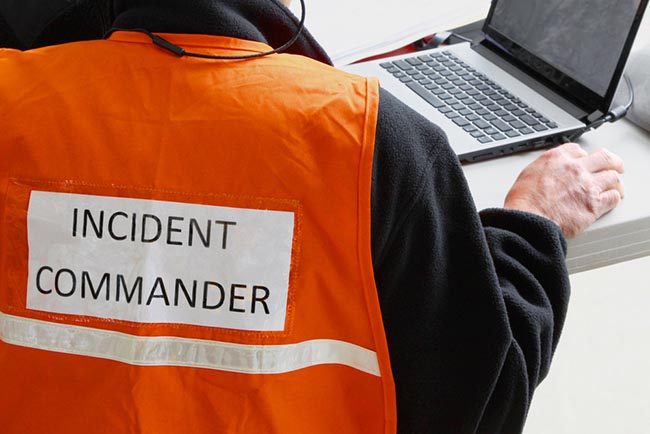Summary
This is a classroom-based 1-day SCS-certified course that explores introductory fundamental concepts of incident command. It is an entry-level course intended for use within industry and municipal fire services. It is available from SCS when requested to suit your schedule, with a minimum of 5 student enrollments required.
When an incident or accident occurs at an industrial or commercial facility, organization and effective action are needed to help preserve lives and property. SCS’s technical training division offers incident command courses to assist workers, management, and executives at the various stages of accident/incident response.
Course Content
This program gives you the skills to confidently and efficiently use the incident command system and its components. Course topics include the following:
- Operational plans
- Emergency response plans
- Integration of operational plans and emergency response plans into daily operations
- Command structures
- Operational integration
- Incident management systems
- Elements and components of IMS
- Incident commander roles and responsibilities
- Incident command for mass casualty
- Brief history of incident command
- Scene size-up
- Post incident critique and evaluation
- Tabletop exercise
- Communications
- Introduction to multi-agency response
In this course, you will learn what incident management systems look like, what they do, and how they help an incident commander protect lives and property. You will examine what elements and components assemble into a functioning, effective incident management system as well as a historical look at the evolution of incident command through the previous two centuries.
You will explore the roles set out by legislation and regulation, including the responsibilities and liabilities the incident commander assumes and how command structures are designed, developed, and deployed. This includes how workers, technical rescuers, emergency responders, and technology are integrated by an incident commander.
You will also cover what operational plans are and how they are used and how ERPs are developed and used. You’ll look at how to integrate operational plans and ERPs into daily operations. You’ll review the place of the tabletop exercise for working with your team to develop and deploy a response by an organization to an accident or incident.
You will also learn how to quickly and effectively do scene size-up to evaluate and triage for emergency response systems during an accident or incident. You will cover how to communicate with law enforcement, emergency services, and the media as an incident commander. You’ll also review how to negotiate and communicate during multi-agency responses to severe emergency situations.
The course also deals with how an incident management system changes to adjust for mass casualty accidents and incidents. It also reviews how to perform post incident critique and evaluation to see how to iterate, refine, and improve an organization’s incident command process. This includes discussion of what an incident briefing and a debrief involve and why they are important.
Upon successful completion of this course, you will have the option to move into the Incident Command Level 2 (Advanced) – 10H (SCS) course.
Note that SCS recommends bi-yearly internal training to maintain these skills.
Prerequisites and PPE
To enroll in this course, you must be 18 years old.
You don’t need to complete any other courses or have any prior experience to enroll in this course. However, this course is recommended for staff in a supervisory or management role. You also don’t need to bring along any personal protective equipment (PPE).
Note: All courses require you to have government-issued photo ID.

